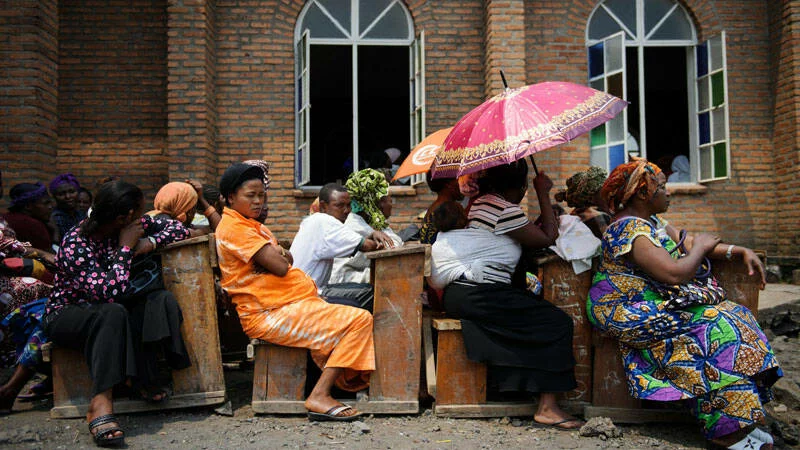Let me start with a story. One Sunday morning Neema (I’ll be using pseudonyms for all people mentioned), a very faithful and normally cheerful believer and Sunday School teacher in our local congregation in northeastern DR Congo, came to church looking absolutely terrible. When asked what was wrong, she said that she had been troubled by “spirits” several nights in a row and had not been able to sleep.
The pastors and elders of the church immediately agreed that we would go to her home that evening to pray with her. After a wonderful time of worship, one of the elders led us in a reflection on a psalm, focusing on God’s great goodness and power. We then prayed with Neema, asking in Jesus’ name that the Father would protect her and give her peace. When we were done, radiating a new confidence, Neema expressed the conviction that there would be no more visitations from those “spirits.” And so it was.
That was not the end of the matter, however. Neema had not told us the whole story. Apparently, the “spirits” that had visited her had looked or sounded like her neighbor, Shukuru. Neema rather unwisely mentioned this fact to one of Shukuru’s coworkers, and that coworker in turn passed the juicy gossip on to Shukuru herself. In Shukuru’s mind, this could only mean that Neema was accusing her of being a “mulozi”—a witch.
Furious, Shukuru went looking for Neema, apparently intending to carry out some kind of physical assault. Word of this new crisis reached one of the elders of our church. He came to get me (I happened to be the most readily available at the moment), and together we went to talk things over with Shukuru.
As we sat in her house, Shukuru poured out her anger and frustration. Never had anyone accused her or anyone in her family of witchcraft. She had been raised in a Christian home on a mission station in the area, and that heritage was still significant to her. Neema’s allegations had hurt her deeply.
Christ Jesus died to redeem us from Satan’s deceptive rule over our lives.
The elder and I responded by making it clear that for our part we certainly were not interested in accusing her of being a witch. Nor did we think that this was Neema’s intention either. We suggested that this might be Satan’s effort to sow discord between them. Perhaps an evil spirit had appeared to Neema in Shukuru’s form. (Although we didn’t mention other possible explanations, one could with relative ease come up with other ways of interpreting Neema’s experience, in terms of psychological factors and culturally reinforced beliefs, for example—realities that the enemy could use to cause conflict between these two women.) In any case, we continued, there was no reason to allow Satan to have his way in this situation. Christ Jesus died to redeem us from Satan’s deceptive rule over our lives. Satan can do nothing without God’s permission, and no doubt God had allowed this to happen to test our faith so that ultimately we would better understand his love for us. We offered to invite Neema to join us so that we could clear the air and pray together.
Shukuru agreed, and when Neema arrived, she confirmed what we had said. She had not intended to accuse Shukuru of being a mulozi. She stated that they had always been good neighbors, and she suggested that this incident surely represented an effort on Satan’s part to ruin their friendship. We prayed together, and now the affair really did come to an end. Years later I asked the elder whom I had accompanied on that visit if there had since been any further developments, and he was able to tell me that as far as he knew the conflict had never resurfaced.
Some Brief Reflections
In my experience, Christians living in the area of northeastern DR Congo where my wife and I have worked (and continue to be involved on a yearly short-term basis) do not seem to live with any great fear of witches despite their insistence on the objective reality of witchcraft and their lively accounts of witches’ extensive powers and hideous activities. Nor do they participate in the common practices of witch-identification or the commonly adopted efforts to manage the danger that witches are believed to represent. In fact, they actively avoid those practices and discourage others from engaging in such things.
These brothers and sisters are active members of churches that continue week-by-week with dynamic preaching of God’s Word, insist on the importance of pastoral training, and are part of broader “denominations” of churches with their overarching discipline. These churches seek to provide caring ministry to all segments of their membership—women and men, children and young people. All of this contributes to the formation of meaning-making communities in which the most destructive elements of witchcraft discourse are officially resisted through teaching and pastoral care, and in which the fear of witches tends to get crowded out by all kinds of good healthy churchly activity. In all this is, it seems, a kind of alternative “witchcraft discourse” and a set of pastoral practices that to one degree or another is undermining the fear of witches and consequent conflicts and injustices that often arise out of witch-identification.
What I have just described is not, of course, a universal feature of the Congolese Christian community. There are many churches, for example, where leaders actively seek to identify and, in many cases, to exorcise demons of witchcraft from parishioners suspected of harming others by means of occult powers. But for many churches this is not the common practice. A great deal of the scholarly attention to Christian responses to witchcraft has focused on the independent “revivalist” churches that have shown a greater willingness to engage directly with suspected witches (here I am thinking of the work of Birgit Meyer, Ruth Marshall-Fratani, David Maxwell, Philip de Boeck and others).
It would be fair to say, on the other hand, that “mission churches” (and by this I mean those churches that maintain a greater degree of continuity with the tradition of western evangelical mission agencies), have not received the same kind of sustained attention from scholars. Perhaps they are less interesting in that they have stayed closer to the “mother ship.” But it is at least worth asking if we aren’t missing something here. After all, the independent and “spiritual” responses to witchcraft have sometimes been described as exacerbating rather than really alleviating the climate of fear and the degree of social turmoil that are often associated with witchcraft discourse and beliefs. This is especially true as children increasingly become the focus of witch-identification and exorcism in many of these churches. There may, after all, be room for the independent churches to learn something from their more staid brethren in the mission churches.
Looking Ahead
In future posts I’d like to open discussion on three potentially promising areas of current pastoral practice. The first of these is theological: What are the biblical themes that church leaders call on as they help parishioners face their fears and the pressures from family members to “do something” about the witches that allegedly lurk behind this or that problem? The second I would label epistemological: What are the common procedures used in society for identifying witches or interpreting life’s difficulties in terms of the activities of witches, and how do church leaders propose alternatives to these ways of knowing? The third one I’m not sure how to label. It is perhaps simply a catch-all for different practical ways that church leaders deal holistically with situations that arise in the context of their ministries. For one example, read a story I relayed to Bob Priest a couple of years ago.
The story that I began this post with is an example of my own fallible efforts, together with other church leaders, to work in this direction. I’d be very happy to have others comment on what we might have done better in that particular case.





Comments
Be the first one to make a comment!